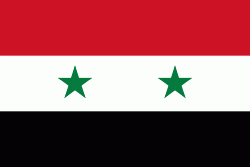Abu Kamal (Ālbū Kamāl)
Abu Kamal (أَبُو كَمَال) or Al-Bukamal (ٱلْبُوكَمَال) is a city on the Euphrates river in the Deir ez-Zor Governorate of eastern Syria near the border with Iraq. It is the administrative centre of the Abu Kamal District and the local subdistrict (Abu Kamal Subdistrict). Just to the south-east is the Al-Qa'im border crossing to the town of Husaybah in the Al-Qa'im District of Iraq's Al Anbar Governorate.
When part of the Ottoman Empire, Abu Kamal was called kışla, pronounced locally as "qashla", which is a Turkish word for "military barracks". This name "Qashla" is still used by some inhabitants of the area, especially by elderly villagers. The name "Al-Bukamal" (البوكمال) means "the family of Kamal", Kamal being the tribe that lives there, whereas the name "Abu Kamal" means "the father of Kamal".
When part of the Ottoman Empire, Abu Kamal was called kışla, pronounced locally as "qashla", which is a Turkish word for "military barracks". This name "Qashla" is still used by some inhabitants of the area, especially by elderly villagers. The name "Al-Bukamal" (البوكمال) means "the family of Kamal", Kamal being the tribe that lives there, whereas the name "Abu Kamal" means "the father of Kamal".
Map - Abu Kamal (Ālbū Kamāl)
Map
Country - Syria
 |
 |
| Flag of Syria | |
The name "Syria" historically referred to a wider region, broadly synonymous with the Levant, and known in Arabic as al-Sham. The modern state encompasses the sites of several ancient kingdoms and empires, including the Eblan civilization of the 3rd millennium BC. Aleppo and the capital city Damascus are among the oldest continuously inhabited cities in the world. In the Islamic era, Damascus was the seat of the Umayyad Caliphate and a provincial capital of the Mamluk Sultanate in Egypt. The modern Syrian state was established in the mid-20th century after centuries of Ottoman rule. After a period as a French mandate (1923–1946), the newly-created state represented the largest Arab state to emerge from the formerly Ottoman-ruled Syrian provinces. It gained de jure independence as a democratic parliamentary republic on 24 October 1945 when the Republic of Syria became a founding member of the United Nations, an act which legally ended the former French mandate (although French troops did not leave the country until April 1946).
Currency / Language
| ISO | Currency | Symbol | Significant figures |
|---|---|---|---|
| SYP | Syrian pound | £ or لس | 2 |
| ISO | Language |
|---|---|
| AR | Arabic language |
| HY | Armenian language |
| EN | English language |
| FR | French language |
| KU | Kurdish language |















